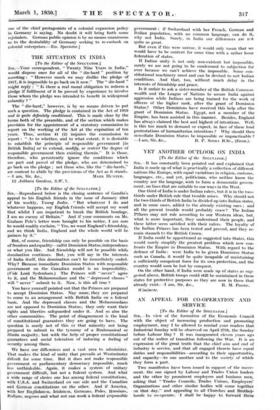[To the Editor of the SPECTATOR.] SIR,— Reproduced below is the
closing sentence of Gandhi's appeal to his English friends in the issue of January 23rd 'of his weekly, Young India.–"But whatever I do and 'whatever, happens, my English friends will accept my word that whilst I am impatient to break the British bondage, I am no enemy of Britain." And if your comments on Mr. Graham Pole's letter were brought to his notice, I am sure he would readily exclaim, " Yes, we want England's friendship, and we think India, England and the whole world will be gainers by it."
But, of course, friendship can only be possible on the basis
of freedom and equality—call it Dominion Status, independence or what you like. And friendship will not be possible while domination continues. But, you will say in 'the interests of India itself, this domination can't be immediately ended. Why? Because immediate Dominion Status with responsible government on the Canadian model is an impossibility. (Vide Lord Sydenham.) The Princes will "never" agree to it, and the Mohammedans and the ," depressed classes " will-" never" submit to it. Now, is thiS all true ?
You have yourself pointed out that the Princes are prepared
to accept Dominion Status. Nay more, they are prepared to come to an arrangement with British India on -a federal basis, And the depressed classes and the Mohammedans are not opposed to Dominion Status; they only want their rights and liberties safeguarded under it. And so also the other communities. The point 'of disagreement is the kind of constitutional• guarantees they are going to have. The question is surely not of this or that minority not being prepared to submit to the tyranny of a -Brahmanical or Hindu majority, but with the -help -of proper constitutional guarantees and social toleration of inducing a feeling of security among them.
We have our differeficei and a vast area to administer.
That makes the kind of unity that prevails at Westminster diffeult for some time. But it does not make responsible government or parliamentary democracy impossible, much less unthinkable. Again, it makes a system of unitary government diffieult, but not a federal system. And what a wide range of choice one has among federal constitutions, with U.S.N. and Switierland on one side and the Canadian and German constitutions on the other. And if America, with her Englishmen, Irishmen, Germans, Poles, _Russians, Italians, negroes and what not can work a federal responsible
government ; if Switzerland with her French, German and Italian population, with no common language, can do it, why not India. Surely, in India our differences are nit quite as great.
But even if this were untrue, it would only mean that we would have to be content for some time with a rather loose federation of states.
If Indian unity is not only non-existent but impossible, surely we are not going to be condemned to subjection for ever because we can't achieve the impossible. Some con- stitutional machinery must and can be devised to suit Indian conditions. And that, too, without much delay in the interests of friendship and peace.
Is it unfair to ask a sister-member of the British Common- wealth and the League of Nations to secure India against aggression while Indians are being trained for the work of officers of the higher rank, after the grant of Dominion Status.? Other Dominions have received this help after the grant of Dominion Status. Egypt, not a member of the Empire, has. been assisted in this manner. Besides, England has always claimed the best and highest of intentions. Well, is this too much to demand or expect, in face of these loud protestations of humanitarian intentions ? Why should then mmediate Dominion Status be impossible or impracticable ?
























































 Previous page
Previous page